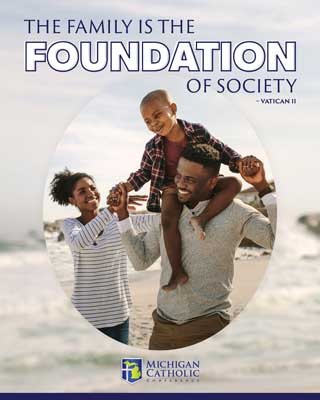Lansing Update: A Catholic Response to the Population Problem
Posted December 15, 2023
Population Growth Strategy Needs More Emphasis on Family Life, MCC Says
Michigan Catholic Conference (MCC) this week continued its advocacy for family-centered population growth policies by issuing a response to the release of the final report from the Governor’s population growth council.

The Growing Michigan Together Council released its report of recommendations to the Governor and Legislature on how to grow Michigan’s stagnant population. In response to that, and building off previous correspondence with the council, MCC issued a press release noting that while portions of the report are welcome and deserve legislative support, policies that emphasize family life and encourage married couples to have and raise children in Michigan were unfortunately missing.
“Making it easier to have and raise children in this state will help families already here to grow and prosper, and at the same time, attract people from other states to move to Michigan with their family or to start their family here,” said Paul Long, president and CEO of MCC, in the press release this week.
MCC previously sent a letter to the council during its public feedback process, sharing that the family is the foundation of society, and that developing policy solutions should be done through the lens of how to support and grow families. The state’s birthrate reaching a historic low is another important area of concern and something that deserved more attention in the council’s final report, MCC argued.
The press release did commend the council’s mention of widening the pool of immigrants that can apply for driver’s licenses, especially since MCC has long supported this policy as a matter of human dignity.
MCC also noted that greater access to housing for low-income families, along with access to childcare, are equally welcome in a state where a greater focus is needed on supporting families and young children in need.
Final Piece of RHA Signed, Removing State’s Partial-Birth Abortion Ban
MCC this week lamented the signing of a bill that ends the state’s prohibition on the late-term, partial-birth abortion procedure. The Governor signed the final piece of the Reproductive Health Act (RHA), which, among other provisions, repeals the state’s partial-birth abortion ban.
“The fact that the state will no longer penalize an abortionist who uses this procedure to destroy the life of a child in the very late stages of pregnancy, when that child could otherwise live outside his or her mother’s womb, represents an unjust action upon the most vulnerable members of our society,” said Rebecca Mastee, policy advocate for MCC, in a statement issued to the press. “It is regretful that the Legislature prioritized legalizing this abhorrent partial-birth abortion procedure instead of ensuring all pregnant women in need are provided adequate resources and services for their families both before and after birth.”
The legislation signed into law — House Bill 4949 — also puts the language of the Proposal 3 constitutional amendment into state law, and repeals the Abortion Insurance Opt-Out Act, which protected employees from paying for their coworkers’ abortions through employer-provided health coverage.
MCC commented on the broader RHA package at length in a press release issued last month when the Governor signed the other portions of the legislation.
MCC Joins Effort Urging Senate to Pass Bill Improving Public Defense for Juveniles
MCC joined several other statewide organizations in calling on the Legislature to deliver a final key part of a wide-ranging juvenile justice reform package.
House Bill 4630 would set statewide standards for providing public defense for juvenile offenders. It passed the House on a bipartisan vote but did not make it out of the Senate.
MCC signed onto a letter from the State Bar of Michigan, the ACLU of Michigan, and other organizations in calling for the Senate to finish the work on juvenile justice reform and to pass House Bill 4630.
The bill was part of a broader juvenile justice legislative overhaul, which included several bills that MCC supported. The overhaul legislation originated from a state task force that issued recommendations to address the disparities and injustices faced by juvenile offenders and their families in their interactions with the juvenile justice system.
The rest of the package was signed into law by the Governor this week.
New Laws Include Protections for Vulnerable Adults, Tougher Penalties for Church Vandals
The Governor recently signed into law two bill packages that MCC supported this session.
First, House Bills 4476 and 4477 specifically criminalize the vandalism of a church or sacred space. The legislation creates tougher penalties for people who intentionally target a sacred space for vandalism. MCC advocated for this legislation by sharing with lawmakers a list of documented attacks on Catholic churches in Michigan as well as across the United States.
Second, House Bills 4320 and 4387 prohibit a person from intentionally or knowingly coercing, compelling, or exploiting a vulnerable adult in a way that causes the vulnerable adult to provide sexually explicit visual material to that person or any other person. MCC worked closely with the family whose experience with vulnerable adult abuse spurred their advocacy for the bill.
